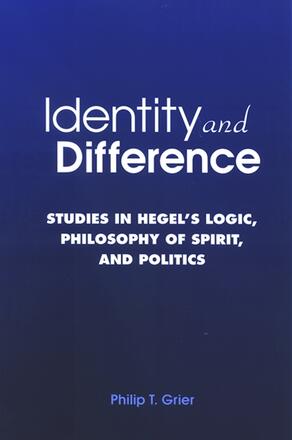
Identity and Difference
Studies in Hegel's Logic, Philosophy of Spirit, and Politics
Alternative formats available from:
Contributors draw on Hegel’s account of identity and difference to challenge conventional theories of identity.
Description
Identity and difference (or sameness and otherness) are contrasting but interrelated terms that have played an explicit role in the development of Western philosophy at least since Plato wrote the Sophist. As Plato pointed out then, and Hegel reiterated more recently in his Science of Logic, the proper comprehension of these terms, and particularly of their interrelation, plays a fundamental role in shaping our conception of philosophical reason itself. The contributors in this book examine Hegel's treatment of these terms, and the role they play in structuring his philosophical system as a whole and also in shaping his conception of dialectical reasoning.
Philip T. Grier is Thomas Bowman Professor of Philosophy and Religion at Dickinson College. He is the editor of Dialectic and Contemporary Science: Essays in Honor of Errol E. Harris and author of Marxist Ethical Theory in the Soviet Union.
Reviews
"Identity in and through difference is the pervading principle of Hegel's philosophical system. The essays in this book will do much both to explain and clarify Hegel's argument and to counteract unfounded criticisms that have been made even by some otherwise competent Hegelian scholars. The chapters cover the entire scope of Hegel's writing: Logic, Philosophy of Mind, Philosophy of Right, and World History, giving a comprehensive view of the way in which Hegel treats the interrelation of identity and difference in these various fields. " — Errol E. Harris, author of Apocalypse and Paradigm: Science and Everyday Thinking
"This challenging and exciting book covers a unified conceptual theme applied both abstractly and concretely in important areas. " — David Kolb, editor of New Perspectives on Hegel's Philosophy of Religion
"The majority of the contributors to this book are prominent Hegel scholars known for their previous rigorous work, joined by some newer names, all demonstrating mastery of the topic. This collection will be essential reading for those seeking clarification about some of the most challenging issues and problems in Hegelian thought, for scholars who wish to keep abreast of cutting edge work in Hegelian studies, and for any philosopher grappling with the issues of identity and difference. " — David Duquette, editor of Hegel's History of Philosophy: New Interpretations